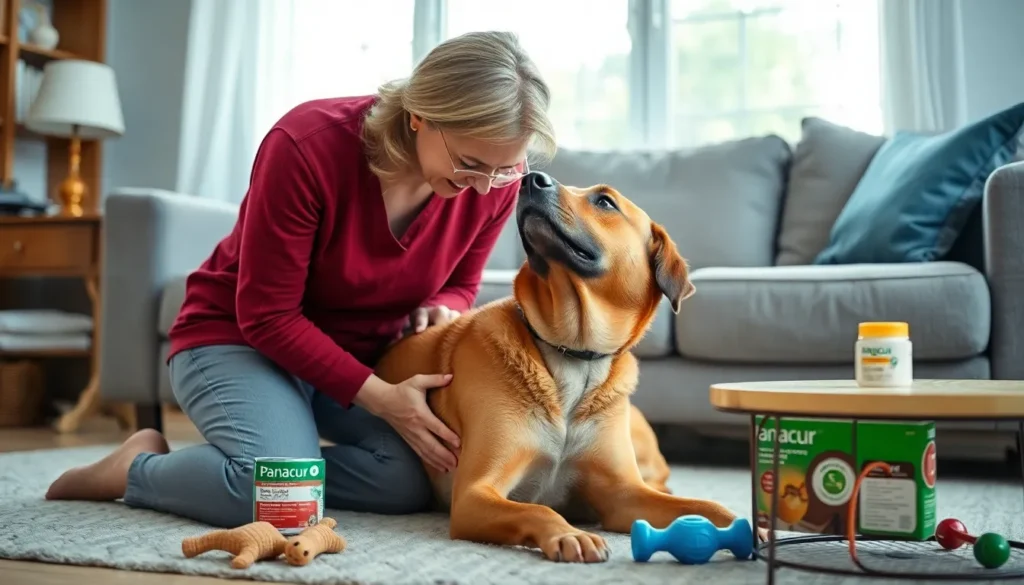Table of Contents
ToggleWhen it comes to keeping dogs healthy, many pet owners turn to Panacur, a popular deworming medication. While it’s effective against various parasites, understanding its potential side effects is crucial for responsible pet care. Knowing what to expect can help owners make informed decisions about their furry friends’ health.
Panacur is generally well-tolerated, but like any medication, it can cause adverse reactions in some dogs. From mild gastrointestinal upset to more serious concerns, being aware of these side effects can lead to quicker responses and better outcomes. This article will explore the common side effects of Panacur, helping dog owners navigate the benefits and risks associated with this treatment.
Overview of Panacur for Dogs
Panacur contains fenbendazole, an effective deworming agent for canines. It treats various parasitic infections, including roundworms, hookworms, whipworms, and certain tapeworms. Panacur works by preventing the parasites from metabolizing carbohydrates, leading to their elimination from the dog’s system.
Panacur is administered orally, often in paste or granule form. Dosing depends on the dog’s weight and the specific condition being treated, necessitating guidance from a veterinarian for accurate dosage. Typical treatment durations range from a single dose to several days, based on the severity of the infestation.
Side effects associated with Panacur may include:
- Gastrointestinal issues: Symptoms such as vomiting, diarrhea, and lack of appetite can occur. These effects are usually mild and resolve quickly without treatment.
- Lethargy: Some dogs may show decreased energy levels, which usually subsides as the body adapts to the medication.
- Allergic reactions: Rarely, dogs might experience allergic responses, characterized by swelling, itching, or difficulty breathing. Immediate veterinary attention is crucial if these symptoms arise.
Panacur’s efficacy in clearing parasitic infections makes it a valuable option for dog owners, provided they monitor their pets for potential side effects.
Common Uses of Panacur

Panacur serves as a crucial medication in treating parasitic infections in dogs. It effectively targets a variety of intestinal worms, ensuring optimal health for pets.
Treatment of Parasites
Panacur treats several parasitic infections in dogs, including:
- Roundworms: Common in puppies, roundworms can lead to serious health issues if untreated.
- Hookworms: These parasites attach to the intestinal wall, causing blood loss and anemia.
- Whipworms: Whipworms live in the large intestine and can cause severe intestinal inflammation.
- Certain tapeworms: These parasites can affect a dog’s overall health and are often transmitted through fleas.
Panacur disrupts the metabolism of these parasites, rendering them unable to absorb nutrients. Administering Panacur at the onset of infection aids in swift recovery.
Dosage Guidelines
The dosage of Panacur varies based on a dog’s weight and specific condition. Dosage recommendations include:
- For general deworming: 50 mg per kg (22.7 mg per pound) of body weight, administered once daily for three days.
- For giardiasis: A higher dose of 100 mg per kg (45.4 mg per pound) of body weight for three consecutive days is advised.
Always consult a veterinarian for tailored dosing instructions. Factors such as the dog’s age, overall health, and specific parasite type influence dosage decisions. Proper dosing ensures effective treatment while minimizing the risk of side effects.
Side Effects of Panacur in Dogs
Panacur can lead to several side effects that vary in severity. Monitoring dogs during treatment helps ensure their well-being.
Gastrointestinal Reactions
Gastrointestinal reactions commonly occur with Panacur use. Dogs may experience vomiting, diarrhea, and mild nausea. Loss of appetite can also happen, typically resolving a few days after treatment ends. Adequate hydration is essential during this period. If symptoms persist or worsen, contacting a veterinarian is advisable.
Allergic Reactions
Allergic reactions to Panacur, although rare, can be serious. Signs may include swelling of the face or limbs, difficulty breathing, or hives. These reactions require immediate veterinary attention. Owners should observe their pets closely for any unusual symptoms during treatment.
Behavioral Changes
Behavioral changes may manifest when dogs are on Panacur. Instances of lethargy or increased agitation can occur. Significant alterations in energy levels or temperament warrant a consultation with a veterinarian. Understanding these potential changes ensures timely intervention and appropriate care.
When to Consult a Veterinarian
Consult a veterinarian if a dog exhibits any unusual or severe side effects after taking Panacur. Signs such as persistent vomiting, diarrhea lasting more than 24 hours, or noticeable changes in appetite warrant immediate professional evaluation.
Seek veterinary advice whenever allergic reactions are suspected. Symptoms like swelling, hives, difficulty breathing, or excessive drooling can indicate a serious allergic response. Quick intervention can prevent complications.
Monitor behavioral changes closely. If a dog shows signs of lethargy, agitation, or any abnormal behavior lasting longer than one day, contacting a veterinarian is essential. These changes may signal an adverse reaction needing medical attention.
Contact a veterinarian if treatment doesn’t seem effective. If a dog’s condition doesn’t improve within a few days, further assessment and potential alternative treatments may be necessary.
Keeping an open line of communication with a veterinarian ensures a tailored approach to the dog’s health. Regular follow-ups are vital when administering any medication, including Panacur, to address any arising concerns promptly.
Understanding the side effects of Panacur is crucial for responsible pet ownership. While the medication is effective in treating parasitic infections, monitoring a dog’s response during treatment is essential. Owners should be aware of common reactions like gastrointestinal issues and potential allergic responses.
Consulting a veterinarian is always recommended if any concerning symptoms arise or persist. By staying informed and vigilant, dog owners can ensure their pets receive the best care possible while minimizing risks associated with medication. Prioritizing communication with a veterinarian will help navigate any challenges and support a dog’s overall health during treatment.




